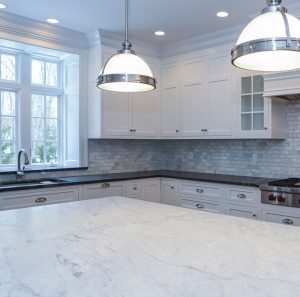Considering Marble Countertops? What You Need to Know about Etching

What exactly is etching?
You may have heard of etching when it comes to metalwork – it’s the process of using strong acid to cut into parts of the metal surface to create a design. Cool, right? Not so much when it comes to marble.
Etching in marble countertops is caused by the same thing – acid. Because marble is a soft stone and made of calcium carbonate, it is very prone to marking and etching. When acid touches your marble surface and reacts with the calcium carbonate, a tiny bit of the surface is eaten away and dull spots (known as etches) are created. Since etching can remove the polish or sealant from marble, the stone can become more vulnerable to scratching as well.
What specifically causes etching on marble countertops?
If you’re researching marble for your kitchen countertop, you might be wondering how strong the acid needs to be? Lemon juice, tomato sauce, coffee, wine, soda… all may leave marks and cause etching.
“But what if I wipe it up right away?” Wiping a spill up fast will certainly help, but it’s not a guarantee. Acid and calcium carbonate react quickly to change the surface of the stone and can cause the dulling effect known as etching.
Is etching a big deal?
This one is up to you. Some people can live with the natural dull spots that can appear on marble over time. For some, careful use and maintenance may be the answer. Others find beauty in etching and consider the areas of use a part of the natural pattern of the stone.
If you absolutely do not think you can live with etching, marble countertops might not be the right choice for you in your kitchen. However, you might want to consider them for another application, such as your bathroom where there is lesser chance of etching.
Are there ways to avoid etching on marble countertops?
We could say to never use citrus or acid, but that’s just not realistic. You might be as careful as possible, but if a friend places a wine bottle on your countertop at a party and wine drips down, it could leave a mark.
The best thing you can do is purchase honed marble countertops, instead of polished, so your dull spots blend in.
Honed marble has already been dulled before purchase. It has a more matte appearance which is a modern trend and more casual look than highly polished marble. Etching marks can still show, but they won’t be as obvious as they are on a polished surface. They can, instead, look like a natural part of the stone.
Don’t misunderstand – honed marble does not etch less. It etches the same, but it is much less noticeable because the marble is already dull.
For reference – honed marble countertops are typically sealed, as well. They just have a matte finish, instead of polished.
If you’re nervous about etching, you might also want to think about purchasing Carrara marble – it is typically the most heavily gray-veined which hides the etched spots well. Choosing a marble without veining (such as Calcutta is likely to show dull spots more.
What can you do about etching?
There are products on the market that can help remove marks on marble. Before you try anything, we highly advise that you speak with your natural stone fabricator to ensure the product is safe to use on your countertops. You certainly don’t want to make your situation worse!
If you’re considering marble for home, it’s important to use a professional fabricator or installer – ensuring that the surface is professionally sealed upon installation will help to prevent damage.
If you currently have marble countertops with etch marks, it’s time to bring in the professionals. Diamond abrasives can be used to get rid of etch marks – much like sandpaper can get rid of marks on wood. The marble can then be resealed.
Marble countertops aren’t for everyone. If you’re on the fence and feel like you can deal with a bit of etching, then we advise considering them. If etching is a worry but you love the style, you might want to consider a quartz marble look-a-like which will resemble the look of marble but is a man-made surface designed for durability. Granite and quartzite are also great alternatives.
Ready to look at options for your own countertops? Academy Marble has one of the largest warehouses for natural and engineered stone in the New York or Connecticut area. Feel free to stop in or contact us at any time to discuss your needs.


